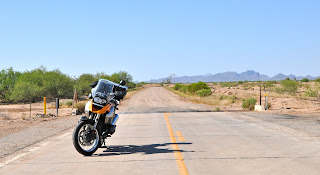Itinerant's Itinerary: San Luis
You think you had a bad day at work? Imagine this scenario. You
live in San Luis, Rio Colorado, Mexico, across the border from San Luis,
Arizona, which lies about 20 miles south of Yuma, and is bordered to
the west and south by Mexico. You awake at 3 am to start your commute
because you have to cross at the border checkpoint that is usually
backed up for a couple of hours, and you have to be at your work pickup
site by 6 am. From there you are taken an hour away to work in one of
the produce fields that ring San Luis and Yuma. At 5 pm you are taken
back to your pick up site and you recross the border into Mexico,
getting home after 7 pm. And tomorrow you start it all over again.
This
is the typical workday for thousands of workers who live in San Luis,
Mexico and cross the border legally each day to work in Arizona. Over
ten thousand Mexicans cross at San Luis each day to work or shop for the
day along the Arizona border. Dozens of small shops, diners, and food
trucks line the main street at the border crossing in San Luis.
 |
| A limo service in San Luis |
I
stopped at one cafe that had a sign in the window that said it was open
24 hours a day. When I asked the cashier if it was busy enough to stay
open all night, she said that 3 am to 7 am was their busiest time
because of the workers crossing early in the morning.
I took
photographs of the cashier and the sign in the cafe window, but they no
longer exist, because they were confiscated and deleted by border patrol
agents. I was photographing the colorful archway that crosses the
border checkpoint displaying the flags of Mexico and the United States,
when I was surrounded by six federal agents. One, the leader, was in a
black SWAT-type uniform, while three were Border Patrol agents and two
were Immigration and Naturalization Service officers. The lead agent
asked who I was and what I was doing, so I explained my trip and it's
purpose (which earned me a strange look), and why I was taking
photographs. He asked for my camera and began to scroll through the
pictures. He told me that the border crossing was federal property and I
was under their jurisdiction. I said I didn't think taking pictures
was illegal, and he said it wasn't illegal, as he continued to scroll
through the pictures. Then he cited the authority of Homeland Security
and his anti-terrorism assignment, and told me that for the safety of
border personnel, he was going to delete all the photos that included
border guards.
None of the agents offered to show me any ID. I guess their uniforms
and their holstered sidearms were badges enough. The agent proceeded to
delete photos from my camera, including, I later realized, many that
did not include border guards, such as the cafe window sign and the
cashier. He was very polite and after deleting my images he shook my
hand and wished me a good trip. I looked at the six agents still
surrounding me and asked him if I could get a group photo as a
souvenir. He scowled and said that it wasn't funny, but a couple of the
younger agents smiled anyway. I was able to snap one photo of the
border crossing from my bike on the way out of town.
 |
| Border crossing at San Luis |
That same day I had two more encounters with border agents. While
traveling from Yuma to Casa Grande, I was stopped, along with everyone
else on I-10, at a border patrol checkpoint set up to search for
vehicles carrying undocumented immigrants that have crossed the border
on foot and been picked up in Arizona by an awaiting ride. I was waved
through quickly, since it was clear my bike's side cases held no
passengers.
 |
| Border patrol checkpoint on I-8 |
Later I pulled off the road for a rest and water break at a
desolate road that became unpaved a few hundred yards from the highway.
 |
| Unpaved road into the desert west of Casa Grande |
While I was standing next to my motorcycle
drinking bottled water, a Pinal County Sheriff pulled up and asked what
I was doing. I told him and he said that I should be careful because I
was stopping at a pickup spot for illegal immigrants. He pointed out
the discarded water bottles and cloth sacks that he said had been left
by those who had crossed from Mexico on foot and been picked up by an
awaiting vehicle where my bike was now parked. With a friendly wave he
then took off into the desert along the unpaved road.
 |
| Trash said to be left by immigrants crossing on foot |
Despite my three encounters with border law enforcement, compared to the
workers that cross the border at San Luis each day, I had a very easy
day.

No comments:
Post a Comment